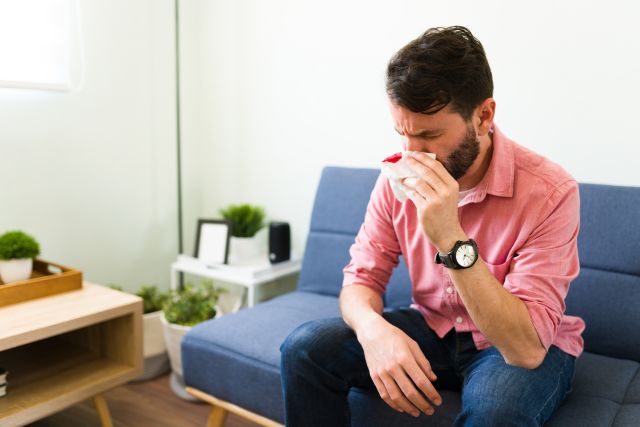Updated on September 20, 2024.
You’re minding your own business when suddenly you’ve got a runny nose—and it’s not just running mucus. Before you know it, you’ve made a mess. Where’s a tissue? It’s a nosebleed!
In most cases, nosebleeds aren’t anything to worry about. But it can be frightening, annoying, or embarrassing if you have one in public.
Nosebleeds can happen anytime, but you’re more likely to get them in winter.
“Winter is a drier, colder time, which is more irritating to the inside of the nose. We’re also spending more time outdoors,” says David Hnida, DO, a family practitioner in Denver, Colorado.
“The air indoors also tends to be much drier when the heat is running,” Dr. Hnida adds. "Because of that, we wind up having more drying and cracking of the mucous membranes inside of the nostrils.”
Most nosebleeds occur in small vessels near the front of the nose and are relatively minor. Less commonly, they involve large blood vessels at the back of the nose. That “posterior” type of nosebleed, which tends to happen in people with bleeding disorders or with hardened arteries, is more serious and requires immediate medical attention.
The people most likely to get nosebleeds
Anyone can have a nosebleed, but they are likelier in certain groups of people. These include:
- Children between ages 2 and 10
- Middle-aged and older adults
- Pregnant people
- People with blood-clotting disorders
- People taking drugs that interfere with blood clotting
Other people more likely to get nosebleeds include those with colds, allergies, or sinusitis.
“If you’re coming off a cold or some sort of upper respiratory infection, you’re more prone to having nosebleeds for weeks afterwards until the inside lining of the nose goes back to normal,” Hnida says.
Other frequent causes of nosebleed include:
- Nose-picking
- Frequent nose-blowing
- Chemical irritation from cleaning supplies, fumes, or inhaled drugs
- High altitudes, where the air is thinner and drier
- Deviated septum
- Frequent use of nasal sprays for stuffy nose
Ways to prevent nosebleeds
Here’s how you can help keep the lining of your nose moisturized and healthy.
Use a humidifier. “They can be really helpful, especially while you’re sleeping,” says Hnida. Humidifiers put moisture back into the dry air that would otherwise inflame the airways of the nose and throat.
Stock up on saline spray. Hnida is a fan of saline (saltwater) nasal spray to moisten dry nasal passages and prevent drying and cracking. “Pick up a bottle of over-the counter saline spray and use it every day in the winter,” he suggests. This may ease allergy symptoms and runny noses, too.
Nix the sticks. Smoking tends to irritate and dry out the nose. Try smoking less or quitting altogether.
Moisten the membranes. Gently spreading a layer of water-soluble gel or petroleum jelly 1/4 inch up your nostrils with a cotton swab may help prevent drying as well.
In addition, Hnida suggests making sure you’re drinking enough water.
How to handle a nosebleed
If you happen to get a nosebleed, here’s what to do:
- Sit upright and lean your head slightly forward—not back like you may have heard before. If blood trickles down your throat, you could get queasy or vomit.
- Blow your nose gently to get any small clots out.
- Pinch the soft part of your nose firmly between your thumb and forefinger for at least 5 minutes by the clock. (Hnida suggests 10 minutes.)
- Breathe calmly through your mouth while you wait. Resist the temptation to check if the bleeding has stopped until at least 5 minutes have gone by. If you let go any earlier than that, it’s likely you’ll still have bleeding.
- If you’re still bleeding, pinch your nostrils together for an additional 10 minutes without letting go.
A squirt of over-the-counter decongestant spray into the bleeding nostril may help, followed by 5 to 10 more minutes of pinching the nostrils together.
After you’ve stopped the bleeding, you need to avoid bending over, straining, or lifting anything heavy. Don’t blow or rub your nose for several days. Your nose needs time to heal.
When to get help
Get emergency care for a nosebleed if any of the following happens:
- The bleeding hasn’t stopped after you’ve pinched your nostrils shut for 15 to 20 uninterrupted minutes
- Fast bleeding or bleeding more than a cup of blood
- Dizziness, lightheadedness, shortness of breath, or a racing heart
- Trouble breathing
- Vomiting from swallowing blood
- The nosebleed follows a head injury
Nosebleeds are usually harmless, but Hnida says if you’re having three to four nosebleeds a week you should see your healthcare provider (HCP).
You should also follow up with an HCP if you bruise easily, your mouth bleeds when you brush your teeth, or you have excessive bleeding with cuts or scrapes. Feeling weak, tired, faint, cold, and looking pale along with having nosebleeds would also merit a visit to your provider. Lastly, see your HCP if you are taking blood thinners or you know you have a blood-clotting problem.







